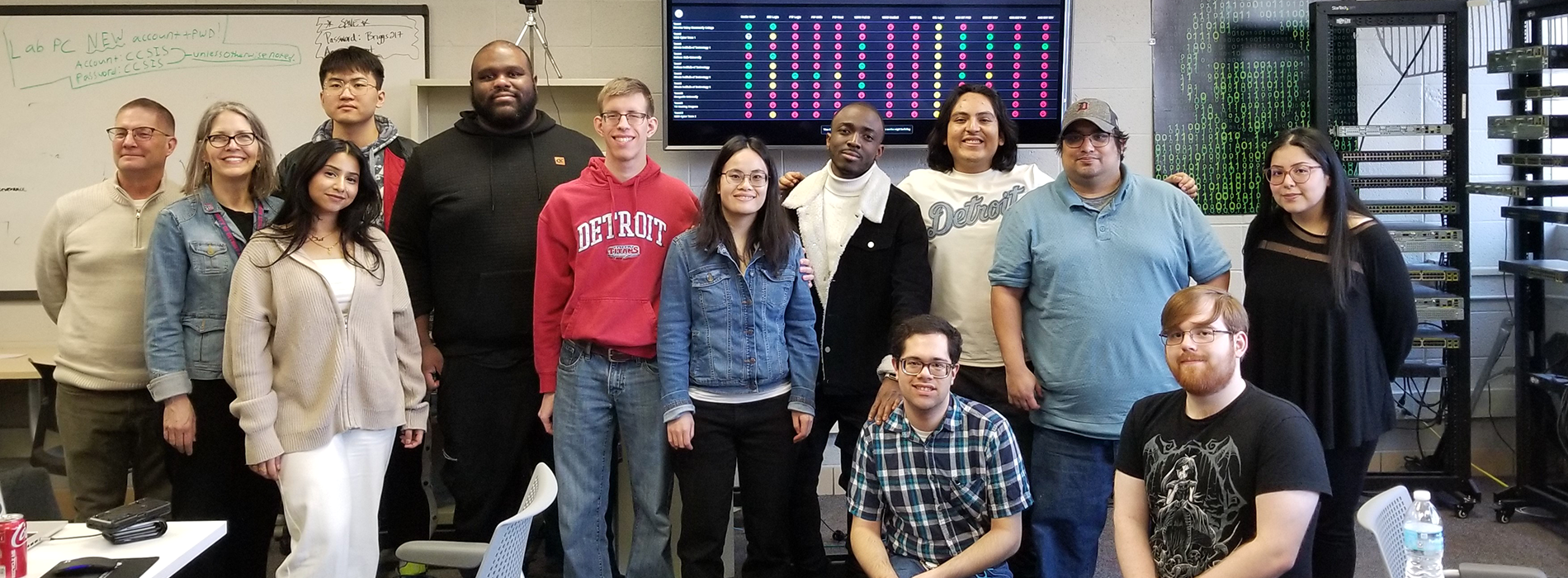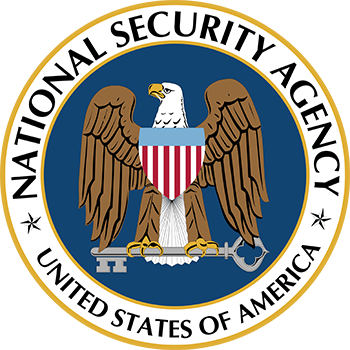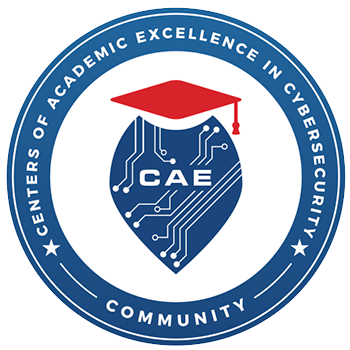Center for Cybersecurity & Intelligence Studies

Center for Academic Excellence in Cyber Defense (CAE-CD)
The Center for Cyber Security & Intelligence Studies (CCSIS) contributes to the knowledge, skills and abilities of current and emerging cybersecurity professionals to guide their logic, critical thinking and ethics through affiliated graduate programs, an experiential lab and community outreach activities. The CCSIS is housed in University of Detroit Mercy's College of Humanities, Arts & Social Sciences.
Value to the Nation and Community
The Center for Cyber Security & Intelligence Studies celebrates almost two decades of evolving excellence through the embodiment of our teaching in graduates who have gone on to work for Federal security agencies, Fortune 500 companies and not-for-profit organizations. In addition, our leading-edge cybersecurity lab provides dual value by providing our students with the tools to help law enforcement recover and validate through digital forensics.
Validated Programs of Study
University of Detroit Mercy’s B.S. in Cybersecurity and our M.S. in Cybersecurity Management have been validated by the National Security Agency.
University of Detroit Mercy is designated by the National Security Agency as a Center of Academic Excellence in Cyber Defense (CAE-CD).


External News
Krebs On Security
- For the past week, the massive "Internet of Things" (IoT) botnet known as Kimwolf has been disrupting the The Invisible Internet Project (I2P), a decentralized, […]
- Microsoft today released updates to fix more than 50 security holes in its Windows operating systems and other software, including patches for a whopping six […]
- A prolific data ransom gang that calls itself Scattered Lapsus ShinyHunters (SLSH) has a distinctive playbook when it seeks to extort payment from victim firms: […]
- The cybercriminals in control of Kimwolf — a disruptive botnet that has infected more than 2 million devices — recently shared a screenshot indicating they'd […]
- A new Internet-of-Things botnet called Kimwolf has spread to more than 2 million devices, forcing infected systems to participate in massive distributed denial-of-service (DDoS) attacks […]
- Microsoft today issued patches to plug at least 113 security holes in its various Windows operating systems and supported software. Eight of the vulnerabilities earned […]
Secure World
- In the modern corporate landscape, cybersecurity has long been viewed as a necessary expense—a "grudge purchase" designed to prevent disaster. […]
- In an era where cyber threats transcend borders and impact nations worldwide, understanding which countries are best prepared to defend […]
- Microsoft continues to release frequent updates that reshape how organizations approach Microsoft 365 security. Recent announcements highlight how quickly vulnerabilities […]
- For the first time in history, annual CVE disclosures are projected to surpass 50,000.
- The recently released "Intel 471: 2026 Cyber Threat Trends & Outlook" report serves as a reminder that while cybersecurity professionals […]
- The Internet of Things (IoT) has altered our world, connecting billions of devices—from smart thermostats and wearables to industrial sensors, […]
Dark Reading
- After detecting a zero-day attack, the country's effective response was attributed to the tight relationship between its government and private […]
- Keenadu downloads payloads that hijack browser searches, commit ad fraud, and execute other actions without user knowledge.
- Russia-aligned groups are probable culprits behind the wiper attacks against renewable energy farms, a manufacturer, and a heating and power […]
- Remote monitoring and management (RMM) software offers hackers multiple benefits, including stealth, persistence, and operational efficiency.
- ClickFix campaigns have adapted to the latest defenses with a new technique to trick users into infecting their own machines […]
Resources
- Detroit Mercy Cybersecurity Club – Open to all majors, the Detroit Mercy Cybersecurity Club, sponsored by the Detroit Chapter of ISACA, is an opportunity for students to delve deeper into computers and cybersecurity.
- NICCS – Cybersecurity CISA Resources and Tools, Cybersecurity Training Resources, Education Resources.
- TryHackMe – An interactive cybersecurity training platform offering guided labs and challenges to learn hacking and security concepts in a hands-on environment.
- Hack The Box – A penetration testing platform with virtual labs that challenge users to hack into simulated systems, enhancing offensive security skills and knowledge.
- NCAE Cyber Games – A competition platform for students participating in cyber games, supported by the National Centers of Academic Excellence in Cybersecurity, aimed at developing practical cybersecurity skills through competitive events.
- CyberSeek—To help close the cybersecurity skills gap, CyberSeek provides detailed, actionable data on supply and demand in the cybersecurity job market.
- CyberMission.tech – A Department of Defense (DoD) cyber initiative with high-tech, hands-on opportunities for military personnel, Veterans, and the public.
- CISA Cybersecurity Resources: Telework guidance and best practices, assessments, prevention, and response resources, cybersecurity awareness and best practices resources, misinformation, disinformation, and malinformation resources, mitigating cyber risks to the nation’s critical infrastructure.
Security Resources
Goals & Unique Features of the Center
Following the goals for the National Initiative for Cybersecurity Education, the Center provides education, advanced security research and service to:
- To advance the cybersecurity capabilities of the workforce within the Detroit Mercy service region as well as nationally.
- To increase the number of highly educated, digitally literate citizens within underrepresented people and veterans and to produce professional specialists in areas of critical need.
- To generate educational, outreach and research activities that will ensure the protection of the critical infrastructure of the United States as a whole.
Internal News
-
Affiliated Faculty
Cybersecurity & Information Systems and Criminal Justice Programs
- Gregory Laidlaw, DMIT, department chair and lecturer of Cybersecurity & Information Systems
- Dan Shoemaker, Ph,D., director of the Master of Science in the Information Assurance Program
- Erick Barnes, department chair, instructor of Criminal Justice and Director of the Master of Science in Intelligence Analysis Program
- Anne Kohnke, Ph.D., director of the Center for Cyber Security & Intelligence Studies and associate professor of Cybersecurity & Information Systems
-
Cybersecurity Center Advisory Board
- William Bowen '03, '05, U.S. Army, TACOM
- Edward Bobola III, senior master sergeant, 110 OG (USA)
- Mike Brennan, founder of Michigan News Network
- Shaun Cavanaugh, chief information security officer at the National Park Service
- Marrci Conner, faculty at Henry Ford College
- Kurt Gollinger, chief operating officer at Central Bureau of Investigation (CBI)
- Jason Grembi '02, author of Secure Software Development, certified information systems security professional and senior cybersecurity architect, Vehicle Services department at General Motors
- Michael Huguley '07, Infrastructure Manager / Infrastructure Architect
- Keith Jaroszewski, '09, '10, senior penetration Tester at Synchrony
- J.T. Jones '05, deputy cybersecurity program manager at the US Army in Europe G6
- Daniel Kennedy, principal consultant at Forensic Criminology Associates
- Kristin Judge, founder of Cyber Crime Support Network
- Dan Lohrmann, chief strategist and chief security officer at Security Mentor, Inc.
- Christopher Martella '15, attorney at Kemp Klein Law Firm
- Richard Marshall, chairman of the board at Cinturion
- Janell McLemore '09, access manager at the U.S. Department of Defense
- Sajay Rai, President, certified public accountant, certified information systems security professional and certified information security manager at Securely Yours
- James L. Rainey, Ph.D., III, '95, '97, information technology specialist at the U.S. Government
- Stephanie Scheurmann, cyber threat intelligence specialist at Ford Motor Company
- Bob Sherman, associate professor and chair of Computer Information Systems at Sinclair Community College
- Ken Sigler '98, faculty at Oakland Community College
- Christopher Sorensen, senior cybersecurity researcher at GE Digital
- Ryan Spangler, senior account executive cybersecurity practice at TEKSystems
- Mary Sparks, '05, WebFOCUS senior SDA, Ford Motor Company
- Caston Thomas, President at InterWorks, LLC
- Dave Trader, chief strategy officer at GalaxE Solutions
- Tabice Ward, director/computer and information science and engineering (CISE) at DTE Energy
- Jeff Weber, Department of Defense
- Brad Wilkerson, principal engineer at Walt Disney Imagineering
- Angela Williams, enterprise information security officer at Blue Cross Blue Shield of Michigan
